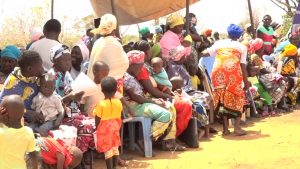At the foot of Mwangea hill in Ganze constituency lies Ndugumnani village, which due to its location on the leeward side of the hill, is extremely dry and patched.
The levels of poverty caused by perennial crop failures in the village have led to famine that has resulted in extension malnutrition among both children and adults, as well as frustrated reproductive health initiatives.

Reproductive Health Network Kenya has camped in the village to provide reproductive health services through its ‘She Decides programme,’ but says the uptake of the services is low because the priority among residents is food.
The organization’s Executive Director, Nelly Munyasia, says her organization is responding to the famine crisis in various parts of the country that were declared to be food deficient in March this year, when the International Committee of the Red Cross (ICRC) indicated that some 3.1 million people in Kenya were affected by famine.
Since her organization does not offer food relief, she is now appealing to the government and humanitarian organizations to send emergency relief food to areas affected by drought, especially in Ndugumnani area, where she says the level of poverty is unfathomable.
“Basically, when you look at these women and children, it is pathetic. The children are malnourished. The women are weak. You can actually see that they have not had food,” Ms Munyasia said during a free reproductive health camp at the Ndugumnani chief’s office recently.
“The problem here is food. There is famine, there is no rain, there is drought and you can see the faces of the population speaking. You see a mother carrying a baby. The baby is malnourished, the mother herself is equally malnourished,” she lamented.
Kadzo Karisa (not her real name) is just 19 years old, but she has already given birth to three children. She fell pregnant while in primary school and her parents forced her to get married to her classmate lover.
Both pupils dropped out of school – the young man to look for menial jobs to fend for his new family while his wife sits at home to nurse her children as she waits for her husband to bring food since the farms are not productive any longer.
Due to the high levels of poverty, Kadzo is unable to use any family planning methods owing to the long distance she has to cover to seek the services from the nearest health facility. And because there is not much to do at home, it is likely that she will fall pregnant with her fourth child soon.
This scenario is replicated in many homes within Ndugumnani location and other villages such as Dzikunze, with some girls being forced to marry elderly persons after being jilted by their age mate lovers who impregnated them.
Anastasia Amina Pola from Dzikunze village says she gave birth to her first-born child when she was 15 years old.
Anastasia, who is now 20 years old, blames poverty for her predicament, lamenting that she had to rely on a young man to provide basic necessities such as sanitary towels as her parents could not afford to buy food as well as the towels.
She also blames peer pressure and a don’t care attitude among some parents on the needs of young girls, leaving them in the hands of predators who approach the girls as Good Samaritans only to leave them devastated.
“The challenges that force young girls to engage in sexual activities include abject poverty. Since our parents cannot afford sanitary towels for us, we are forced to rely on young men who provide money to buy them, but later we have to repay by agreeing to sleep with them,” she says.
She is however, grateful to the Reproductive Health Network Kenya, which through its ‘She Decides,’ programme, has reached out to the village with sensitization messages on reproductive health as well as providing the services free of charge.
Saumu Chengo (not her real name) says she has been forced to secretly seek reproductive health services because her husband has rejected the use of any kind of contraceptives.
“When I talk about family planning, my husband objects, arguing that he can take care of as many as ten children. However, since I value my health, I decided to secretly start using a three-month contraceptive that my husband cannot discover following the advice of the ‘She Decides’ programme,” she says.
Saumu says poverty and poor spacing of children have caused many women in the area to suffer as they are unable to continue breastfeeding their infants while they are hungry or pregnant, thus adversely affecting infants still suckling.
Mary Haluwa Charles, a college student, echoes the sentiment that peer pressure and poor parenting has led many young girls to engage in sexual activities and since there is little education on reproductive health, many of them get pregnant at tender ages.
She is urging parents to take their responsibilities seriously in order to secure their children’s future, while also urging fellow youths to abstain from premarital sexual activities.
Eunice Kazungu from Dzikunze has similar sentiments. She says many women in the area go hungry for long, making it impossible to breastfeed their infants, thus causing the young ones to suffer from malnutrition.
“When we go to the clinics, we are told to give our children balanced diet, but the challenge is that we do not have the money to buy the milk and porridge flour. Many times, we are scolded by health workers for not giving balanced diets to our children, but there is nothing we can do about it,” she laments.
Men have also been cited as a great hindrance to the uptake of reproductive health services, with women interviewed within Ndugumnani area saying their husbands have not embraced the idea of planning their families.
Jonathan Mangaro from Sokoke ward concedes that men have refused to embrace family planning, and he agrees with them.
“I am personally against the use of contraceptives because they bring more health hazards to our women. The pills and injections make our women to become too plump and some even lose their sexual desires, and that is why most men here do not allow their wives to use contraceptives,” Mangaro says.
He is also opposed to the use of protection and wants nongovernmental organizations to promote the use of traditional means of family planning such as helping women to identify safe days in which they can engage in sex without becoming pregnant.
Ndugumnani locational Chief Danson Chengo Kiraga agrees that some contraceptives adversely affect women, but adds that he has been educating his subjects on the use of protection, which he says are safer.
By Emmanuel Masha




















Discussion about this post